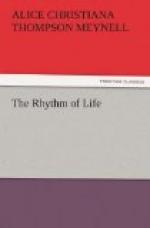That narrow house—there is sometimes a message from its living windows. Its bewilderment, its reluctance, its defect, show by moments from eyes that are apt to express none but common things. There are allusions unawares, involuntary appeals, in those brief glances. Far from me and from my friends be the misfortune of meeting such looks in reply to pain of our inflicting. To be clever and sensitive and to hurt the foolish and the stolid—wouldst thou do such a deed for all the world? Not I, by this heavenly light.
REJECTION
Simplicity is not virginal in the modern world. She has a penitential or a vidual singleness. We can conceive an antique world in which life, art, and letters were simple because of the absence of many things; for us now they can be simple only because of our rejection of many things. We are constrained to such a vigilance as will not let even a master’s work pass unfanned and unpurged. Even among his phrases one shall be taken and the other left. For he may unawares have allowed the habitualness that besets this multitudinous life to take the pen from his hand and to write for him a page or a word; and habitualness compels our refusals. Or he may have allowed the easy impulse of exaggeration to force a sentence which the mere truth, sensitively and powerfully pausing, would well have become. Exaggeration has played a part of its own in human history. By depreciating our language it has stimulated change, and has kept the circulating word in exercise. Our rejection must be alert and expert to overtake exaggeration and arrest it. It makes us shrewder than we wish to be. And, indeed, the whole endless action of refusal shortens the life we could desire to live. Much of our resolution is used up in the repeated mental gesture of adverse decision. Our tacit and implicit distaste is made explicit, who shall say with what loss to our treasury of quietness? We are defrauded of our interior ignorance, which should be a place of peace. We are forced to confess more articulately than befits our convention with ourselves. We are hurried out of our reluctances. We are made too much aware. Nay, more: we are tempted to the outward activity of destruction; reviewing becomes almost inevitable. As for the spiritual life—O weary, weary act of refusal! O waste but necessary




